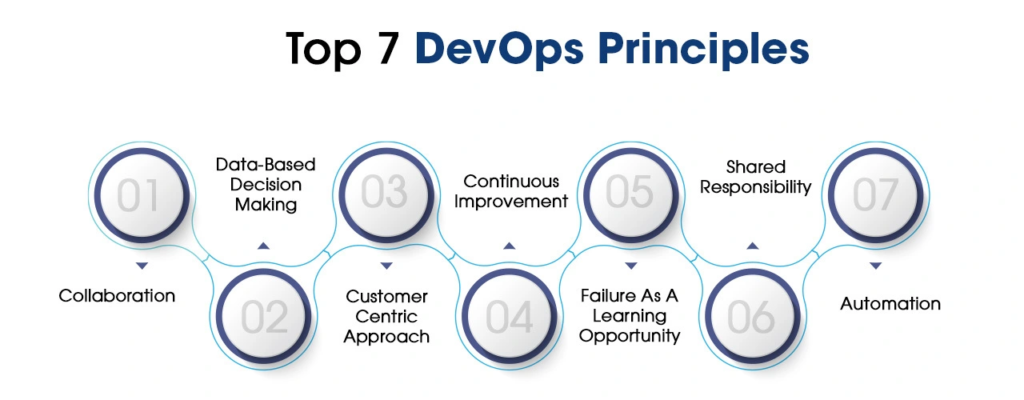The DevOps Master Program is a specialized, in-depth curriculum aimed at professionals who want to master DevOps principles, tools, and best practices. By bridging the gap between development and operations, this program enables teams to deliver software more efficiently and reliably. It is designed not only for individuals aiming to excel in DevOps roles but also for organizations looking to embed DevOps culture into their workflows, as it emphasizes real-world applications, hands-on experience, and collaborative learning.
Core Components and Key Learning Areas
- DevOps Fundamentals and Principles:
- The program starts with the core principles of DevOps, focusing on the integration of development (Dev) and operations (Ops) to foster a culture of collaboration, communication, and continuous improvement.
- It emphasizes continuous integration and continuous delivery (CI/CD), allowing teams to automate testing and deployment, thus ensuring faster and more reliable code releases.
- Other foundational practices include infrastructure as code (IaC), which allows infrastructure to be managed in a structured and repeatable way, and agile methodologies for enhanced flexibility and responsiveness to change.
- Toolchain Mastery:
- Participants gain proficiency in essential DevOps tools like Git (version control), Jenkins (CI/CD automation), Docker (containerization), and Kubernetes (container orchestration).
- Advanced configuration and management tools such as Terraform (IaC) and Ansible (automation) are also covered, providing a strong toolkit for building and managing scalable, automated environments.
- Many programs integrate observability and monitoring tools such as Prometheus and Grafana to help teams track, analyze, and optimize system performance.

- Cloud and Infrastructure Management:
- A significant portion of the curriculum is dedicated to deploying and managing applications in cloud environments, with popular platforms like AWS, Microsoft Azure, and Google Cloud as central to the instruction.
- Participants learn cloud-native architecture principles and gain hands-on experience in cloud provisioning, scaling, and cost optimization, making them adept at building resilient and cost-effective cloud infrastructures.
- Security and DevOps:
- Security is a crucial aspect of modern DevOps, and many master programs now emphasize DevSecOps—embedding security practices directly into the DevOps pipeline to detect and mitigate vulnerabilities early.
- Topics like automated security testing, access control, and compliance requirements are explored in depth to ensure that security is integrated throughout the development lifecycle.
- Monitoring, Logging, and Optimization:
- Monitoring and logging are essential for maintaining system reliability, especially in complex, distributed environments.
- Participants learn to set up monitoring dashboards, implement alerting mechanisms, and perform log analysis, allowing for proactive identification of issues and performance optimization.
- These skills are particularly valuable for site reliability engineers (SREs) and DevOps engineers focused on maintaining high availability and system resilience.

- Real-world Projects and Case Studies:
- Many programs incorporate hands-on labs, group projects, and real-world case studies to simulate complex DevOps environments and challenges.
- These projects allow participants to build end-to-end pipelines, deploy applications, and troubleshoot issues as they would in a real job setting.
- This practical experience helps reinforce learning and prepares participants for the specific demands of DevOps roles.
- Soft Skills and Cultural Shift:
- DevOps is as much about culture as it is about technology. The program often includes modules on collaboration, communication, and change management, as DevOps relies heavily on breaking down silos between teams.
- Emphasis is placed on fostering a culture of continuous improvement, feedback loops, and accountability, which are central to a successful DevOps transformation.
- Certification and Career Support:
- Many programs culminate in a certification, such as the DevOps Master Certification or other recognized credentials, providing proof of skills and knowledge.
- Additionally, participants may receive support for career development, including resume building, interview preparation, and job placement assistance.
Career Paths and Benefits of the DevOps Master Program
Graduates of a DevOps Master Program have a wide range of career opportunities available to them, including:
- DevOps Engineer: Focusing on CI/CD, automation, and efficient deployment pipelines.
- Site Reliability Engineer (SRE): Emphasizing system reliability, monitoring, and proactive incident response.
- Cloud Engineer: Specializing in deploying and managing infrastructure on cloud platforms.
- Security Engineer: Integrating DevSecOps practices to improve security within DevOps workflows.
The DevOps Master Program is highly valuable for professionals aiming to become leaders in IT and software development, as it provides both technical expertise and a strategic approach to modern software practices. By achieving this certification, participants are well-positioned for roles in organizations that prioritize innovation, speed, and agility in software development.

